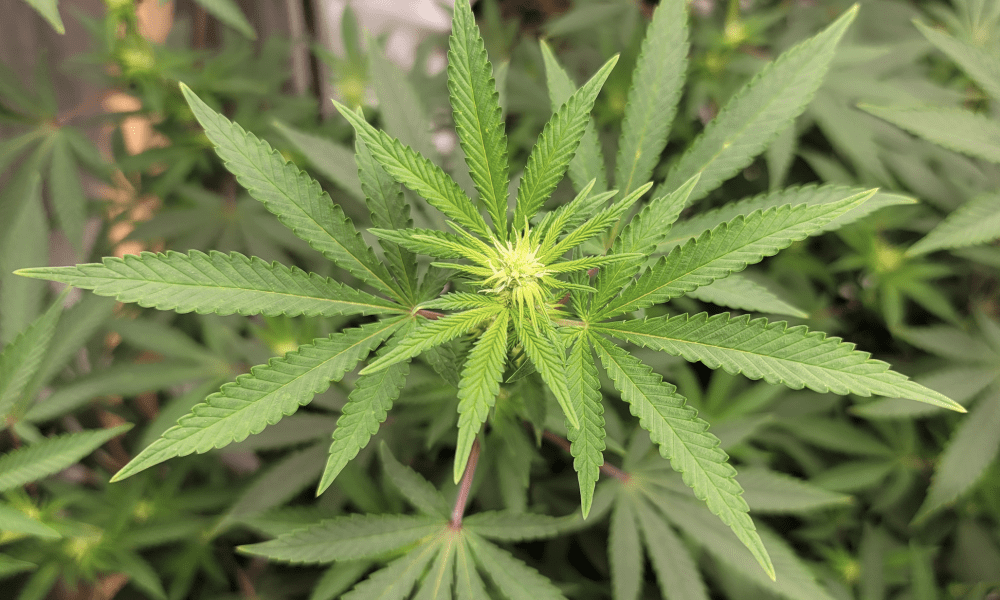featured
Top Marijuana Advocate Who Led Fight For State Legalization Ballot Measures Is Departing To Focus On Preserving Citizen Initiative Process
Published
2 days agoon

If states are the laboratories of democracy, Matthew Schweich has been a top chemist at the Marijuana Policy Project (MPP), playing a pivotal role in multiple campaigns to put medical and adult-use cannabis legalization measures on the ballot in politically diverse states—from Massachusetts to Utah.
But after 10 years at the national organization—widely considered one of the most effective proponents of reform at the state and federal level over its decades of work—Schweich is hanging up his hat. Or hats. While he focused much of his energy on state ballot initiatives, the advocate was also entrusted to helm the ship as interim executive director at various intervals throughout his tenure.
From an outside perspective, it’s somewhat easy to imagine that affecting change on cannabis policy, and getting voters to rally behind legalization, would be a relatively uncomplicated lift. After all, polls consistently show majority (and increasingly bipartisan majority) support for the reform. But the work to achieve those success at the polls is no small task—something Schweich has come to understand well.
It’s also a task that’s become all the more complicated in recent years. With the vast majority of states having legalized cannabis in some form, including nearly half of the country with recreational legalization on the books due in no small part to the advocacy of organizations like MPP, the once robust grassroots movement fueled largely by philanthropic support, has tapered.
It’s that complacency, coupled with an aggressive push to restrict the ability of voters to make decisions on marijuana laws themselves at the ballot in certain state, that gives Schweich pause as he leaves his post. With an end to federal prohibition seemingly within reach, he worries that the lack of attention and funding for state ballot efforts could extend the state-federal policy disconnect indefinitely.
“I just sense that we’ve been taking our foot off the gas,” he told Marijuana Moment. “We need to finish this fight. We haven’t finished it yet.”
To be sure, there are lingering uncertainties about the fate of cannabis reform under President Donald Trump’s second term. The so-far unrealized goal of rescheduling marijuana under a process initiated under the Biden administration has put a fine point on that. And despite Trump’s endorsement of the reform—as well as cannabis industry banking access—he’s been notably silent on the issue since taking office, leaving room for speculation about whether the White House views it as a priority.
If there’s a chance to reach what Schweich calls the “holy grail” of federal legalization, that power has always sat with the states. Red or blue or purple, lawmakers who represent states that legalize cannabis are confronted with the reality that their constituents are ready for a change. Schweich, who is now pivoting to a project where he’s working to defend the citizen initiative process, was a key actor in effectuating that change.
“I hope that we can regain momentum and regain focus and continue the work at the state level—because that’s ultimately what’s going to deliver federal reform: maintaining pressure at the state level.”
Schweich spoke to Marijuana Moment about his role at MPP, the state of the cannabis reform movement and more. The following interview has been lightly edited for length and clarity.
Marijuana Moment: Where did your passion for marijuana policy reform come from?
Matthew Schweich: I’ve just always found the irrationality of making alcohol legal and cannabis illegal intolerable. I’ve always been angry by that inconsistency and all the suffering and harm that it’s inflicted on our society. I’ve long believed that we have a problem in America with how we criminalize our own people and also how we imprison them.
Of all the unjust ways we criminalize people, cannabis prohibition is by far the least defensible, so cannabis legalization always seemed like a way to take a big step in the right direction when it comes to the criminalization and incarceration the American people.
MM: How would you characterize the role of MPP in advance reform to date?
MS: MPP has been instrumental for the 10 years I’ve been there—not just with our ballot initiative victories, but our legislative victories as well. I came to fully understand the benefit of institutional knowledge within a reform movement, and MPP has been that source of institutional knowledge, taking lessons learned from one state—whether it’s with a ballot initiative campaign or a legislative campaign—and applying those in other states, while still shaping the policy to each state.
That requires a national organization that’s plugged in all across the country. And that’s what MPP has been doing for 30 years now.
I always enjoyed the challenge of going to a new state, meeting the people on the ground and finding the right blend of using successful tactics that have that have been effective in other states with the local flavor, and incorporating the input of of the people who know that state.
That’s been a balancing act that I’ve found interesting and stimulating throughout my time at MPP, because you can’t be on either end of the spectrum. You can’t try a strategy without looking at what’s worked elsewhere. And you also can’t go in with a cookie-cutter approach. And a big part of my job has been blending those two things in the right way.
MM: More broadly, where do you see the reform movement going over the coming years?
MS: I am concerned that we’re taking our foot off the gas. You know, when I walk through the MPP office, there’s a wall full of books about the war on drugs—the war on cannabis. And it’s strange to me when you look at how much thought and energy was directed into this movement long before it had a single victory anywhere.
Now we’ve had all these victories, and we’re within striking distance of the holy grail—which is fixing this at the federal level, achieving federal cannabis legalization—and yet it seems difficult for us to maintain people’s attention and commitment.
That’s been frustrating, the last few years, to watch. I just sense that we’ve been taking our foot off the gas, and it seems a shame that if we made all this progress at the state level but then we allow this ridiculous federal policy to persist for many years to come.
We need to finish this fight. We haven’t finished it yet, and there’s still some very large-population states where cannabis is illegal, like Florida and Texas. So I hope that we can regain momentum and regain focus and continue the work at the state level—because that’s ultimately what’s going to deliver federal reform: maintaining pressure at the state level.
MM: To what extent do you think this growing complacency is attributable to the fact that advocates have secured victories in so many states over recent years?
MS: To a certain extent, we’re victims of our own success, because we have achieved so many victories at the state level on both recreational cannabis and medical cannabis, and those victories have occurred in states where voters are more inclined to support legalization.
A lot of people in the country now live in a state that’s got either recreational or medical cannabis legalized who don’t feel this has some urgency, and I do think that’s a contributing factor.
Also, I think another factor is just how turbulent our political climate has become. There’s a sense among many people that we’re facing existential attacks on the very structure—our very democracy itself. And so I think those types of concerns were really not that prevalent 10 or 15 years ago. That pulls energy away from issues like ours.
MM: We’ve seen an uptick on attacks on the citizen ballot initiative process in several states. How concerned are you about that trend? And do you think the success of marijuana policy reform at the polls motivated some of these efforts?
MS: It’s very concerning to see all these different attacks. I’ve been on the front lines of this, as relates to cannabis, and I’m seeing attacks on the initiative process all over the country. I believe the initiative process is a very good thing for the states that have it. It gives the people a way to enact policies when their elected officials don’t listen. And in a very partisan, red-blue political climate, it’s difficult to push your state legislature to enact certain policy on cannabis when everything seems to get filtered through this red-blue lens.
The hyper-partisan nature of politics in this country means that state legislatures are less responsive to the will of the people than I think they’ve been ever, or for a very long time, which makes the initiative process really important.
And I’ve seen the attacks firsthand. In South Dakota, we passed Amendment A, which is recreational cannabis legalization, with 54 percent of the vote—and it was overturned by the South Dakota Supreme Court on a single-subject challenge, which I think was a deeply flawed decision.
In Nebraska, we were about to be on the ballot, and before voters could vote in 2022, but that medical cannabis policy was thrown off the ballot due to a single-subject challenge. So I’ve experienced and been a victim of these attacks.
I don’t think it’s solely a response to the success of cannabis reform that we’re seeing these attacks on the initial process. I think cannabis is a contributing factor, but there’s other issues—like Medicaid expansion that state legislatures in red states were deeply opposed to and where voters overwhelmingly support it. There’s also been a lot of activity in terms of reproductive rights on the ballot ever since Roe vs. Wade was overturned.
So I think it’s a number of issues that have bothered state legislators. They see these as undermining their ability to make all the policy decisions in the state, regardless of what the people want.
Part of what we’re seeing in terms of these attacks on the initiative processes is a result of a disintegration of political norms in the past. We didn’t see these types of attacks in the initiative process 20 or 30 years ago at this frequency. There seems to be a degree of shamelessness now when it comes to many state legislators. They don’t see any real negative potential effect of supporting these attacks to the initiative process, and I think it’s just a decline of our general respect for political norms in this country, which we’ve witnessed over the last seven to eight years.
MM: As I’ve covered these issues, one thing that’s stood out to me are the comments from officials who seem to be implying the electorate can’t be trusted to understand what’s being presented to them on the ballot.
MS: I agree. In the past, I think that there was a certain level of respect afforded to decisions made by the electorate. These days, politicians are very quick to dismiss the results of ballot questions. Again, I just think it’s a behavior that’s been normalized when you’ve got a president making completely unfounded claims about the outcome of an election, or completely misrepresenting what occurred on January 6. It shouldn’t be a surprise that other politicians now feel that they have the latitude to question other types of electoral results. They’re just questioning them in a different way.
We’ve entered an era where it is acceptable behavior to question elections and what they mean. In the past, I think that there was a there was a general understanding that we should respect election results—whether it’s with candidates or ballot questions. And what you also often hear now is politicians saying, ‘Well, people didn’t know what they were voting on. They didn’t understand the initiative.’ I think that’s really disrespectful to voters.
MM: The cannabis industry has faced criticism over the perception it is not doing enough to financially support state legalization initiatives that they’ve benefitted from, especially as philanthropic support for reform efforts has dried up over the years. What’s your take on that?
MS: I’ve long described the challenge of fundraising for cannabis reform to be a tragedy of the commons within another tragedy of the commons. By that I mean, in the early days, it was philanthropists funding cannabis reform because there was no industry—because there was no legal cannabis.
Then after a few victories on the medical side and then the recreational side, we start to see an industry emerge. And this is the first tragedy of the commons, with the philanthropist saying, ‘Well, why should we have to continue to support this? There’s an industry that we helped create through our philanthropy. Can’t they now be the source of funding this reform work?’ And then within that, within the industry, you’ve got all the companies pointing at each other saying, ‘Well, why should I help when my competitors aren’t?’ So that has been the fundamental challenge, in my opinion, for the past, really, 10 years.
I think it’s fair to critique the industry, given how much money was wasted, in my opinion, on premature federal reform efforts. And even in the last several years, we’re seeing enormous amounts of money being being directed to Florida campaigns—huge sums—and at the same time, a very, very small amount by comparison being invested in every other state in the country. I don’t think it’s the most efficient use of resources.
At the same time, I have to point out, I’ve had many successful partnerships with the cannabis industry. They’ve been very strong supporters at times, and I’m very appreciative of those within the cannabis industry who I think were enlightened enough to see the bigger picture.
But I must say, with regard to the biggest companies, it’s been disappointing, in my opinion, in terms of what they’ve contributed to the movement. In my experience, it’s been the medium- and smaller-sized companies that have actually been stepping up to the plate.
MM: There are some who feel strongly that any movement on federal marijuana reform during Trump’s second term will be incumbent on his proactive advocacy. Do you share that view? What’s your sense of how things shake out on federal cannabis policy in the short-term?
MS: I maintain some sense of optimism that things could move. We could see significant movement at the federal level during this administration. Things can change very quickly in the Trump administration. Priorities could change quickly, and there’s still a lot of time. Also [Trump] very strongly supported the Florida campaign in 2024, and I also think he sees the political value of having the Republican party be the party that ends federal cannabis prohibition.
So for those political reasons, I think that there’s still a path to getting something done federally during this administration—but it’s not a given.
I think that maintaining pressure at the state level is the best path forward. We can’t just let the states lie quiet. We have to keep advocating for reform in state legislatures wherever we can so that more and more members of Congress represent constituencies where these policies are in place.
I think part of the challenge is that the Republican leadership in Congress is not at the same point where Trump has been on this issue. That could be something that proves difficult to overcome. And it’s also possible this is stalled out—that we’re going to have [Terrance Cole as] the new head of DEA. We’re not getting many good signs there. So I think there’s still a path, but it very well could be the case that nothing major occurs in the next several years.
MM: Thinking back to when you started working for MPP 10 years ago, did you imagine we’d be at this point, further ahead or further behind on the cannabis policy front?
MS: I think I would have expected about where we’re at. As you know, I’ve long been a pessimist on federal reform—and I’ve been proven right over and over again. I always thought that it would really be a struggle to get this across the finish line at the federal level, so that matches up in terms of the number of states where we’ve passed these policies. It makes sense to me.
When I first joined, I was looking at the polls for our campaigns in Maine and Massachusetts and Arizona—and I saw the polling numbers in this diverse collection of states and figured, ‘Wow, the support is really there. Then we did medical cannabis in Utah in 2018. That’s probably the most surprising thing that I’ve done. It reinforced my belief that medical cannabis could be passed anywhere. So early on, it was clear that there was a major gap between where politicians were and where voters were. So I think we’re about where I would have guessed we’d be at this point.
MM: Are there any specific memories that stand out to you from your tenure at MPP?
MS: The first is in Maine in the winter of 2016. We’re finishing up the signature drive. It was the last day—and in Maine, you have to deliver your petitions to local election clerks. You don’t bring them all to the secretary of state like to do in other states. We were trying to squeeze every last signature out of the signature drive, and we had stacks of petitions with voters from different towns and different places. And we coordinated—I think it could have been in a movie—we coordinated this meet-up at a gas station with three different cars arriving with various stacks of petitions, and we stood in this parking lot of a gas station exchanging paper, frantically jumped back in our cars and then each had a route of towns to hit to drop off petitions before the four o’clock deadline. It was just this very fun and exciting moment in a signature drive.
There’s something very appealing about signature drives to me. A lot of people would hear that statement and think I’m crazy. But I love signature drives because you talk to voters and you force people to interact with their democracy beyond just voting—and you make them think about a policy. It’s not just like, ‘Oh, show up at the polls every year, every two years or every four years. It’s a conversation about a matter of public policy where you, the individual, have the power to bring this decision to everyone. I think there’s something special about that. And also, in working in politics, you’re staring at a screen on your computer like many of us are. But when you’re out collecting signatures, you can pick up that stack of petitions at the end of the day and feel the hard work that you’ve put in.
The other memory is just being in D.C. at a happy hour with my MPP colleagues. When I first joined, the office was teeming with people. There was a real office culture, and we all shared this sense that we were fortunate to get to work on cannabis reform. And it was just a really great group of people that evolved over time, and we were tucked away in Adams Morgan—which people that know D.C. will know that that’s really not a typical place to have an office right there on 18th street. It’s a neighborhood with real character. We were an office with real character, and we went together well. And I just remember the sense of camaraderie, and I think a lot of people can relate to this. When COVID came, it just killed so many office cultures, and I’ll always be thankful that I got to experience a really special and supportive and loving office culture in D.C. as we worked with people all over the country to make positive change.
So those are two memories that stick out.
MM: What can you share about what you’re doing next in your career?
MS: My plan is to work on a new project to defend the initiative process itself. During my time at MPP, I’ve been lucky to work in states all over the country on ballot initiatives, and I’ve come to learn how diverse these processes are—different sets of rules, different petition designs, different procedures for submitting them and validating them and challenging them. And so I’ve learned through all these election cycles working on cannabis policy just how intricate and unique these ballot initiative processes can be. At the same time, I’ve seen firsthand the attacks on these processes.
I found at MPP the incredible value of there being a national organization with the institutional knowledge that’s sharing lessons between states. And I think we need the same thing for defending the initiative process. So that’s what I’ve been working on in South Dakota so far. I have a group there called the Voter Defense Association of South Dakota, and I’m hoping to replicate that in other states and take all the lessons I learned from the cannabis legalization ballot initiatives and apply them to the preservation of the initiative process itself.
It’s something that future generations of voters can use to effectuate positive changes in public policy on a range of issues. What we’re witnessing right now is a breakdown in our political culture as a country. I think what we’ve also witnessed is the failure of political parties to put forward the right types of candidates for voters to decide. That applies equally to the Democratic and Republican parties, and I think now more than ever we need to maintain tools to fix public policy that don’t require the approval of elected officials. I have less respect for our collection of elected officials all across the country than I did in the past.
I hope it gets better. I still respect their positions and authority. I believe in that sense of decorum and respect. But in terms of their policymaking decisions, I’m fairly appalled on a range of issues all over the country. To me, the quality of our elected officials has gone down in recent years, which means that to fix public policy, we need tools like the initiative process. Working on these cannabis campaigns really made me a very big believer in the positive potential of ballot initiatives.
Far-Right Trump Ally Takes Aim At New Psychedelics-Focused Hire At Federal Health Agency

Author: mscannabiz.com
MScannaBIZ for all you Mississippi Cannabis News and Information.
You may like
-


Smoke it or eat it, cannabis is bad for your heart, new research shows
-


Delivered Inc.: A dispensary at your doorstep
-


Fun Things To Do After Consuming Marijuana
-


UCSF Study reveals risk tied to cannabis consumption
-


Oregon Cannabis Companies No Longer Need Labor Peace Agreements to Renew Licenses
-


One question dogs Pennsylvania’s cannabis debate: Should big businesses have a leg up?

Sometimes you just want to cut loose and laugh – here are some suggestion for when you consume
Let’s be real—being high can turn even the most mundane activity into a full-blown adventure. Whether you’re sparking up alone or vibing with your crew, there’s something magical (and hilarious) about the way weed makes everything 10x funnier. If you’re looking for ways to lean into the giggles and good vibes, here are some tried-and-true stoner fun things to do after consuming marijuana which will make you belly laugh.
RELATED: How Hemp Helps You Sleep
Watch Weirdly Specific YouTube Videos
You haven’t lived until you’ve watched a 20-minute deep dive on why Shrek is secretly a cinematic masterpiece—or a guy restoring rusty knives in silence. The weirder and more niche, the better. Bonus points if you’re watching with friends and everyone has different commentary.
Play “High Charades”
Take classic charades, but add the confusion of being high. Someone inevitably ends up acting out a pineapple or accidentally miming their entire life story. It’s chaotic. It’s absurd. It’s comedy gold.

Cook Something You Definitely Shouldn’t Be Cooking
Think: grilled cheese with Doritos, marshmallows, and hot sauce. The high kitchen is a lawless place, where flavor profiles are made up and regrets come later. Just remember to document your “creations”—because your sober self won’t believe it.
Go on a Deep Dive into Random Wikipedia Pages
Start with “platypus,” end up at “the history of vending machines in Japan.” Reading while high becomes a journey through the most bizarre corners of human knowledge. You’ll be smarter? Maybe. Entertained? Definitely.
Try to Beat a Kids’ Puzzle Game
Bust out Connect 4, Jenga, or even those weird logic puzzles meant for ages 6–10. You’ll either feel like a genius or realize you’ve been staring at a Rubik’s cube for 45 minutes. Either way, it’s hilarious.
RELATED: CBD Can Help Your Feet Look Better For Spring
Narrate Life Like a Nature Documentary
Turn your living room into a National Geographic special. Watch your roommate forage in the kitchen like a wild animal. Add a British accent. “Here, we observe the rare species known as ‘Chad’ in his natural habitat… the snack cabinet.”
Listen to a Song That’s Just… Strange
Find the weirdest song you can—something with yodeling or heavy theremin use. Then sit back, close your eyes, and let the confusion wash over you. It’s like going on an intergalactic voyage in your brain.
Being high isn’t just about chilling—it’s about laughing so hard your abs hurt and making memories that are somehow both chaotic and wholesome. Just remember: stay safe, stay hydrated, and never underestimate the comedic power of a banana

Author: mscannabiz.com
MScannaBIZ for all you Mississippi Cannabis News and Information.
featured
Oregon Cannabis Companies No Longer Need Labor Peace Agreements to Renew Licenses
Published
2 hours agoon
May 30, 2025
Fifty-seven percent of Oregon voters believe cannabis retailers and processors should have labor peace agreements as a prerequisite for state licensure, but that public position is now moot.
The Oregon Liquor and Cannabis Commission (OLCC) announced May 29 that, effective immediately, it will no longer require cannabis companies to submit labor peace agreements to apply for or renew their licenses. The commission had adopted that requirement in December 2024, following the previous month’s passage of ballot Measure 119.
The United Food and Commercial Workers (UFCW) Local 555 filed the ballot measure, in part, “due to ambiguity in federal law” that, according to the international labor union, has led to cannabis workers being denied rights, resulting in “unsafe workplaces, wage theft and other abuses.”
“Something that’s rampant in the industry is toxic chemicals, unchecked safety concerns and lack of proper PPE,” Local 555 spokesperson Miles Eshaia told the Oregon News Service in the leadup to November’s election. “Employers often cut corners. They compromise both worker and consumer safety, and you can avoid all that with a collectively bargained agreement and a collectively bargained safety agreement.”
The OLCC’s U-turn on no longer upholding voter-approved Measure 119 comes after U.S. District Court of Oregon Judge Michael H. Simon ruled on May 20 that the ballot measure is preempted by the National Labor Relations Act (NLRA) and violates cannabis companies’ rights to freedom of speech.
“Given this ruling and in consultation with the Oregon Department of Justice, the OLCC will no longer require labor peace agreements as part of cannabis license applications and license renewals,” according to an OLCC news alert released on May 29.
Initially, it was unclear whether Oregon’s Justice Department would appeal Simon’s May 20 ruling.
Before getting overturned, Measure 119 had required cannabis business licensees or license applicants to “remain neutral” with respect to a bona fide labor organization’s representatives communicating with their employees, which Simon ruled was an abridgement of their First Amendment rights.
“Measure 119 is not limited to restricting only threatening, coercive, false, or misleading speech, but instead prohibits all speech by employers that is not ‘neutral’ toward unionization,” Simon wrote in his opinion and order. “Therefore, Measure 119 violates plaintiffs’ First Amendment rights to free speech.”
Cannabis retailer Ascend Dispensary and cannabis processor Bubble’s Hash, both licensed in Portland, Ore., filed the lawsuit in February, naming Gov. Tina Kotek, state Attorney General Dan Rayfield and a pair of OLCC officials as defendants.
The defendants, in part, argued that the NLRA might not apply to state-sanctioned cannabis businesses, which operate in a federally illegal marketplace under the Controlled Substances Act. This presented a “threshold question” in the case that Simon answered.
“The NLRA does not limit its jurisdiction to ‘lawful commerce’ or ‘legal substance,’ as some other federal laws do,” the judge wrote. “The NLRB has issued advisory memoranda dating back to 2013, in which it has stated that the medical marijuana industry is within the NLRB’s jurisdiction if the business meets the NLRA’s jurisdictional monetary requirements.”
With states like California, Connecticut, New Jersey and New York already requiring certain cannabis businesses to enter into labor peace agreements for licensure, a common assumption is that cannabis workers don’t have the right to organize under the National Labor Relations Act and therefore need state statutes.
Jeff Toppel, a partner at Bianchi & Brandt, told Cannabis Business Times in December 2023 that that assumption doesn’t hold.
“The premise of [Oregon’s] statute, and I think a lot of the other statutes that seek to require labor peace agreements, is this false premise that [cannabis workers are] not given the full gamut of federal law, of federal protections, because they’re in cannabis,” Toppel said.
One example is when the National Labor Relations Board (NLRB) ruled in December 2022 that Curaleaf acted unlawfully when the multistate operator refused to come to the bargaining table and recognize that its dispensary workers in Chicago voted to join the UFCW.
Toppel, who has argued countless union cases before the NLRB, said that forcing labor peace agreements through state statutes often leads to employers shopping around to get the best deals, which doesn’t always benefit the employees.
Although cannabis companies are no longer required to strike labor peace agreements in Oregon, nothing is stopping the state’s dispensary workers from organizing on their own.
Simon’s ruling in Oregon, however, collides with a March 2025 decision in the U.S. District Court of Southern California, where Judge Todd W. Robinson dismissed a challenge to California law that requires cannabis business applicants or licensees with 10 or more employees to enter into labor peace agreements.
That lawsuit was filed in April 2024 by Ctrl Alt Destroy LLC, which, according to the California Department of Cannabis Control’s (DCC) licensing database, does business as Embr, a dispensary in La Mesa, San Diego County.
California Attorney General Rob Bonta and DCC Director Nicole Elliott, as plaintiffs, argued that the court should not grant Ctrl Alt Destroy its requested relief because doing so would directly facilitate federally illegal conduct.
Robinson agreed, tossing Ctrl Alt Destroy’s challenge on the conclusion that the federal court could not lend its judicial power to a plaintiff “who seeks to invoke that power for the purpose of consummating a transaction in clear violation of [federal] law.”
In Oregon, a UFCW Local 555 spokesperson pointed out the conflicting federal rulings in a statement provided to KOIN 6 News.
“We now have conflicting federal rulings, with a judge in Oregon putting Measure 119 on hold while a California judge has upheld a similar law,” the spokesperson said. “One of these rulings is destined to be overturned on appeal. Our strong suspicion is that Judge Simon’s opinion, which flaunts Supreme Court precedent, will be the one reversed.”

Author: mscannabiz.com
MScannaBIZ for all you Mississippi Cannabis News and Information.

Colorado’s medicinal psilocybin program is set to launch soon after officials said they have licensed and inspected a testing facility, which was the last type of business required to properly run the program, Marijuana Moment reports.
The Colorado Department of Revenue’s Natural Medicine Division (NMD) said in an email Tuesday that officials are “excited to announce that the first licensed testing facility is fully certified by the Department of Public Health and Environment” (CDPHE).
Colorado voters approved the legalization of psychedelic mushrooms in 2022. Under the proposal, people aged 21 or older can grow and share psychedelic mushrooms, and the state is establishing regulated “healing centers” where people will soon be able to make appointments to consume psilocybin in a controlled environment.
In addition to the testing license, regulators have also approved five separate healing center licenses, three cultivation licenses, and two manufacturing licenses. Dozens more licenses are still pending.
“Now that the Colorado Department of Revenue has licensed cultivators, manufacturers, healing centers, and testing facilities, CDPHE has certified a testing facility, and the Colorado Department of Regulatory Agencies has licensed facilitators, natural medicine can start to be transferred from a cultivator or manufacturer to a lab for testing, then eventually to a healing center where a facilitator can oversee administration.” — CDPHE statement, via Marijuana Moment
The Colorado psychedelics program follows in the footsteps of Oregon, where voters approved a medicinal psilocybin program in late 2020, and the program launched in early 2023.
Get daily cannabis business news updates. Subscribe
Have an additional perspective to share? Send us a message to let us know, and if your comment is chosen by our editors it could be featured here.
Perspective to add? Suggest a revision or submit commentary for review using the form below.
Ganjapreneur is made possible by our partners:

Author: mscannabiz.com
MScannaBIZ for all you Mississippi Cannabis News and Information.

Smoke it or eat it, cannabis is bad for your heart, new research shows

Delivered Inc.: A dispensary at your doorstep

Fun Things To Do After Consuming Marijuana

UCSF Study reveals risk tied to cannabis consumption

Oregon Cannabis Companies No Longer Need Labor Peace Agreements to Renew Licenses

One question dogs Pennsylvania’s cannabis debate: Should big businesses have a leg up?

Star signs and cannabis strains: June 2025 horoscopes

Colorado Psychedelics Program Primed for Launch

Haribo recalls sweets in the Netherlands after cannabis detected

Minnesota Governor Signs Bill To Decriminalize Bong Water Containing Drug Residue

Hot Picks in cannabis stocks – BNN Bloomberg

The Cannabist Co. Completes Previously Announced Plan of Arrangement

German Candy Company Haribo Recalls Products for Unexpected Cannabis Content

Haribo recalls sweets in the Netherlands after cannabis detected

Colorado Governor Announces State’s Psychedelics Program Is ‘Fully Launched’

Smoking Marijuana And Playing Video Games Go Hand In Hand, Right? Not So Fast, Researchers Say

The New Micro Cocktail Trend

Cresco Labs Delivers $30 Million in Q1 Operating Cash Flow

DEA links cannabis to mental health issues (Newsletter: May 30, 2025)

VIDEO: 814 pounds of marijuana recovered at Las Vegas home

Two marijuana trafficking suspects arrested after high-speed pursuit, crash on I-35

Haribo recalls sweets in the Netherlands after cannabis detected

Over $120M in banned cannabis seized by CA task force

DEA Promotes Claim That Marijuana Could Be More Likely To Cause Psychosis Than Meth

Connecticut Appoints The US’s First Cannabis Ombudsperson – Yes there is a pun in there and I’m Sure Erin Kirk Is Going To Hear It More Than Once!

5 best CBD creams of 2024 by Leafly

Alert: Department of Cannabis Control updates data dashboards with full data for 2023

Free delta-9 gummies from Bay Smokes
New Study Analyzes the Effects of THCV, CBD on Weight Loss

Mississippi city official pleads guilty to selling fake CBD products

EU initiative begins bid to open access to psychedelic therapies

May 2024 Leafly HighLight: Pink Runtz strain

Curaleaf Start Process Of Getting Their Claws Into The UK’s National Health System – With Former MP (Resigned Today 30/5/24) As The Front Man

Horn Lake denies cannabis dispensary request to allow sale of drug paraphernalia and Sunday sales | News

Press Release: CANNRA Calls for Farm Bill to Clarify Existing State Authority to Regulate Hemp Products

Nevada CCB to Accept Applications for Cannabis Establishments in White Pine County – “Only one cultivation and one production license will be awarded in White Pine County”

5 best autoflower seed banks of 2024 by Leafly

Discover New York’s dankest cannabis brands [September 2024]

Local medical cannabis dispensary reacts to MSDH pulling Rapid Analytics License – WLBT

6 best CBD gummies of 2024 by Leafly

The Daily Hit: October 2, 2024

5 best THC drinks of 2024 by Leafly

People In This State Googled ‘Medical Marijuana’ The Most, Study Shows

Weekly Update: Monday, May 13, 2024 including, New Guide for Renewals & May Board meeting application deadline

5 best delta-9 THC gummies of 2024 by Leafly

Press Release: May 9, STIIIZY and Healing Urban Barrios hosted an Expungement Clinic & Second Chance Resource Fair

PRESS RELEASE : Justice Department Submits Proposed Regulation to Reschedule Marijuana

Thailand: Pro-cannabis advocates rally ahead of the government’s plan to recriminalize the plant
Trending
-

 Breaking News1 year ago
Breaking News1 year agoConnecticut Appoints The US’s First Cannabis Ombudsperson – Yes there is a pun in there and I’m Sure Erin Kirk Is Going To Hear It More Than Once!
-

 best list10 months ago
best list10 months ago5 best CBD creams of 2024 by Leafly
-

 California Cannabis Updates1 year ago
California Cannabis Updates1 year agoAlert: Department of Cannabis Control updates data dashboards with full data for 2023
-

 Bay Smokes11 months ago
Bay Smokes11 months agoFree delta-9 gummies from Bay Smokes
-

 cbd1 year ago
cbd1 year agoNew Study Analyzes the Effects of THCV, CBD on Weight Loss
-

 Mississippi Cannabis News1 year ago
Mississippi Cannabis News1 year agoMississippi city official pleads guilty to selling fake CBD products
-

 Business8 months ago
Business8 months agoEU initiative begins bid to open access to psychedelic therapies
-

 California1 year ago
California1 year agoMay 2024 Leafly HighLight: Pink Runtz strain



